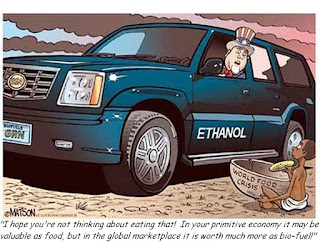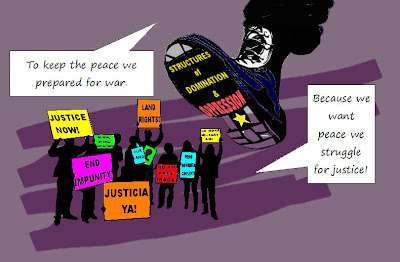Undoing Oppression
14 views
Skip to first unread message
Stewart in Colombia
Jan 19, 2013, 12:46:13 PM1/19/13
to stewart-i...@googlegroups.com
First a short note: After my long silence I'm back! Back in Colombia, well on the road to recovery from a horrible traffic accident, and once again writing for my blog. It seems I've overcome my writers block, for the time being at least. (This piece is a draft for the section on undoing oppression
in our CPT Colombia Webpage) Nevertheless my postings may not be all
that frequent since we are a reduced team right now--there are only
three of us!
Interested in joining CPT anyone?--by Stewart Vriesinga
Christian Peacemaker Teams (CPT) Colombia recognizes that the work of peacemaking is in fact the work of undoing oppression. Oppression is what happens when a group of relatively powerful people abuse their power to exclude, subjugate or otherwise control less powerful people(s). The victims of oppression—including those we partner with in Colombia—not only want an end to the violence used to control them; they want their rights to be respected and the oppression to stop. As implied in our mission statement, in this respect CPT Colombia is neither impartial nor neutral regarding the conflict in Colombia:
We work together on grassroots initiatives to expose and transform structures of domination and oppression through active nonviolence in order to make possible a world grounded in respect, justice and love, even of enemies.
Structures of domination and oppression are structured to confer more privilege on some groups of people than on others. Structures of domination and oppression include things like racism, sexism, hetero-sexism, class-ism, etc. Often these structures are so entrenched in Western culture that would-be peacemakers from that culture may unintentionally reinforce instead of undo some of these structures. As a first step towards undoing the oppression of our Colombian partners, CPT is actively trying to identify oppression and the abuse of unearned privilege that is operative within our own team and organization. Making our team/organization more accessible to, welcoming of, and responsive to members of oppressed groups has enhanced our collective ability to recognize and undo oppression. Oppressed people's analysis, guidance and leadership helps us, not only to undo oppression within our own team and organization; it also helps us become less patronizing and better equips us to be advocates for and allies of our Colombia partners in their struggles to undo oppression.
Although almost all the death threats, extrajudicial killings, forced displacements, etc. to which oppressed Colombians are subjected are carried out by fellow Colombian citizens, the impact of global structures of domination and oppression cannot be overstated. Las Pavas struggle against the bio-fuel (palm oil) industry cannot be divorced from global demand for bio fuel; the oppression of the people of south Bolivar or north-east Antioquia cannot be separated from the conflicting interests of Canadian and other gold-mining corporations and the local population. The oppression of Colombians cannot be eliminated by simply applying made-for-Colombia solutions to made-in-Colombia problems. Colombian victims of violence are being targeted primarily because they are resisting a form of neo-colonialism (often referred to as globalization in the global north).
Colombians who refuse to allow their land, water, mineral, and industrial resources to be commodified and made available to the highest bidders in the global marketplace are at odds with some very powerful global institutions and conventions. They are at odds with structures of domination and oppression such as global corporations, international banks, foreign investors, the World Bank, the International Monetary Fund, free trade agreements, the national interests of foreign countries, to name but a few. Their adversaries have military hardware, trade tribunals, alliances with local governments,
Source
control of most of the media, a great deal of wealth to purchase the collaboration of local governments and opportunists, and a host of other things at their disposal to propagate free market economics and gain access to Colombia's and other nations' national wealth; they repeat the mantra that it is in everyone's best interests—including all Colombians—to allow global allocation of resources to be determined by global consumer demand—demand in which the value, use and destination of the world's increasingly scarce resources are determined, not by the people who own them, but by the amount of money an increasingly small number of well-heeled super consumers are willing to pay for a particular good or a service. Within the framework of these global structures of domination and oppression, using peoples lands for bio-fuel is construed as economic growth; increasing the global marketplace's access to Colombian's resources is construed as creating wealth—not appropriating it; forcing this development model on other peoples not seen as economic imperialism, nor cultural genocide, but rather a benevolent act that can only improve the lives of those who live in under-developed countries. Contrary to the experiences of the populations themselves—the physically and economically displaced—they insist that the previously excluded backward primitive populations will benefit from their superior economic development model. In summary, these global structures of domination and oppression argue they are acting fairly, justly and benevolently, and all those who resist them (including our Colombian partners) are backward and ignorant—either that or communists, socialists or gullible miss-informed innocents, misled by socialists and communists.
Colonialism then & now--forms of racist structural oppression
To help our Colombian partners resist and transform these global structures of oppression and domination CPT Colombia tries to use its privileged access to consumers and decision-makers in the global north. Through lobbying, advocacy work, public direct actions, public education and demonstrations we try to increase respect for and protect the rights of victims of global structures of oppression and domination—their right to land, to water, to self-determination, to their own cultural values, their own community development model, their rights to not be killed or displaced, their right to exist as a culture and a people, etc. We understand that undoing oppression in Colombia means dramatically increasing global respect for local populations—indigenous peoples, Afro-Colombians, campesinos, and workers in Colombia, First Nations in Canada and the United States, etc.—and their right to have control over their own local resources and cultural way of without undue outside interference.
The master's tools cannot dismantle the master's house
Westerners, of course, should also be free to consider their own way of life and of organizing society to be the most advanced in terms of Social Darwinism; perhaps they should even be allowed to consider themselves to have preferred nation status in the eyes of God. But when they deny other peoples and cultures these same freedoms, and further oblige other peoples and cultures to conform to their particular set of beliefs—without their free prior and informed consent—they have crossed the line; they are then abusing unearned privilege and have become one more structure of domination and oppression that must be undone before oppressed Colombians can shed the yoke of oppression.
Reply all
Reply to author
Forward
0 new messages


